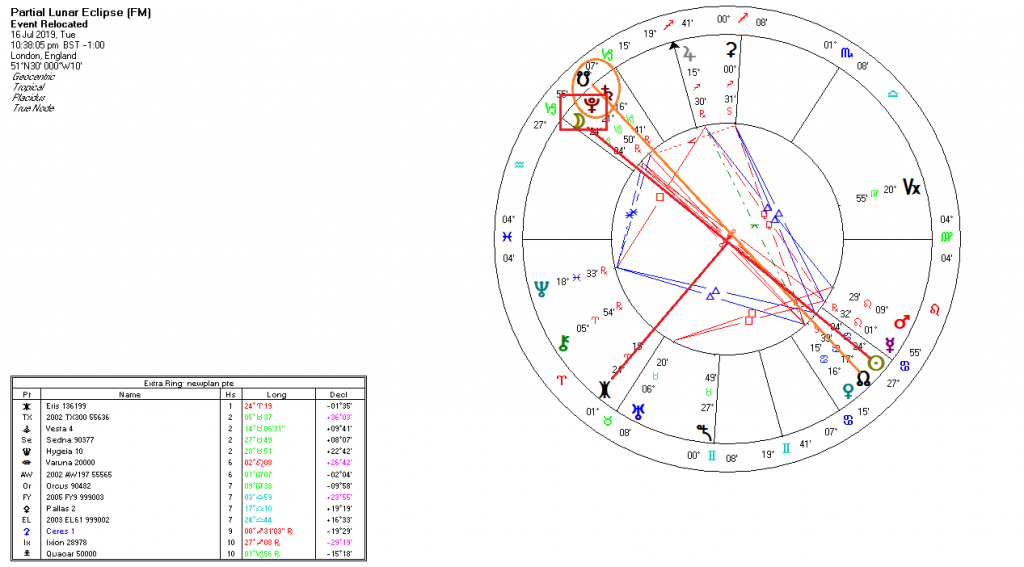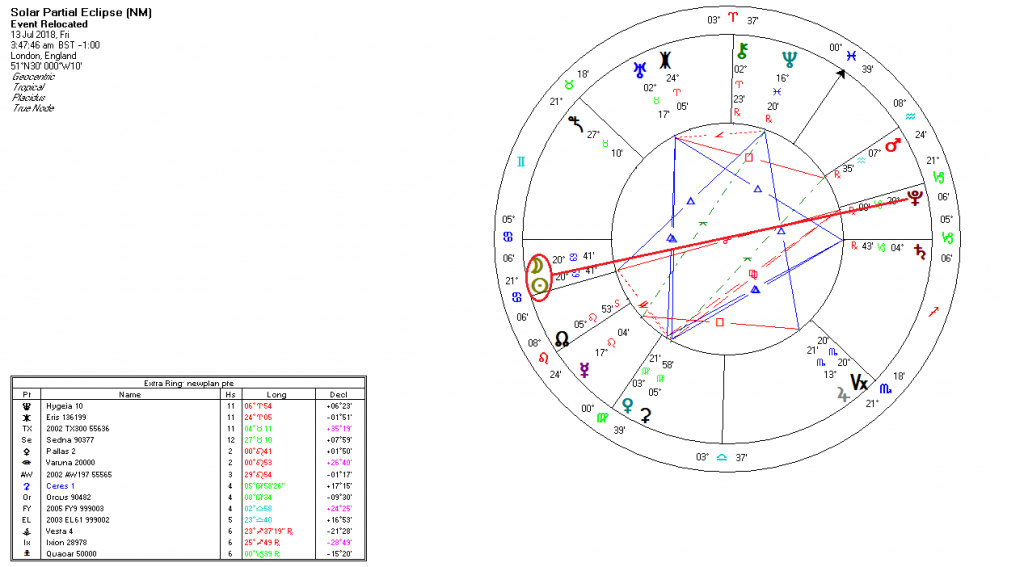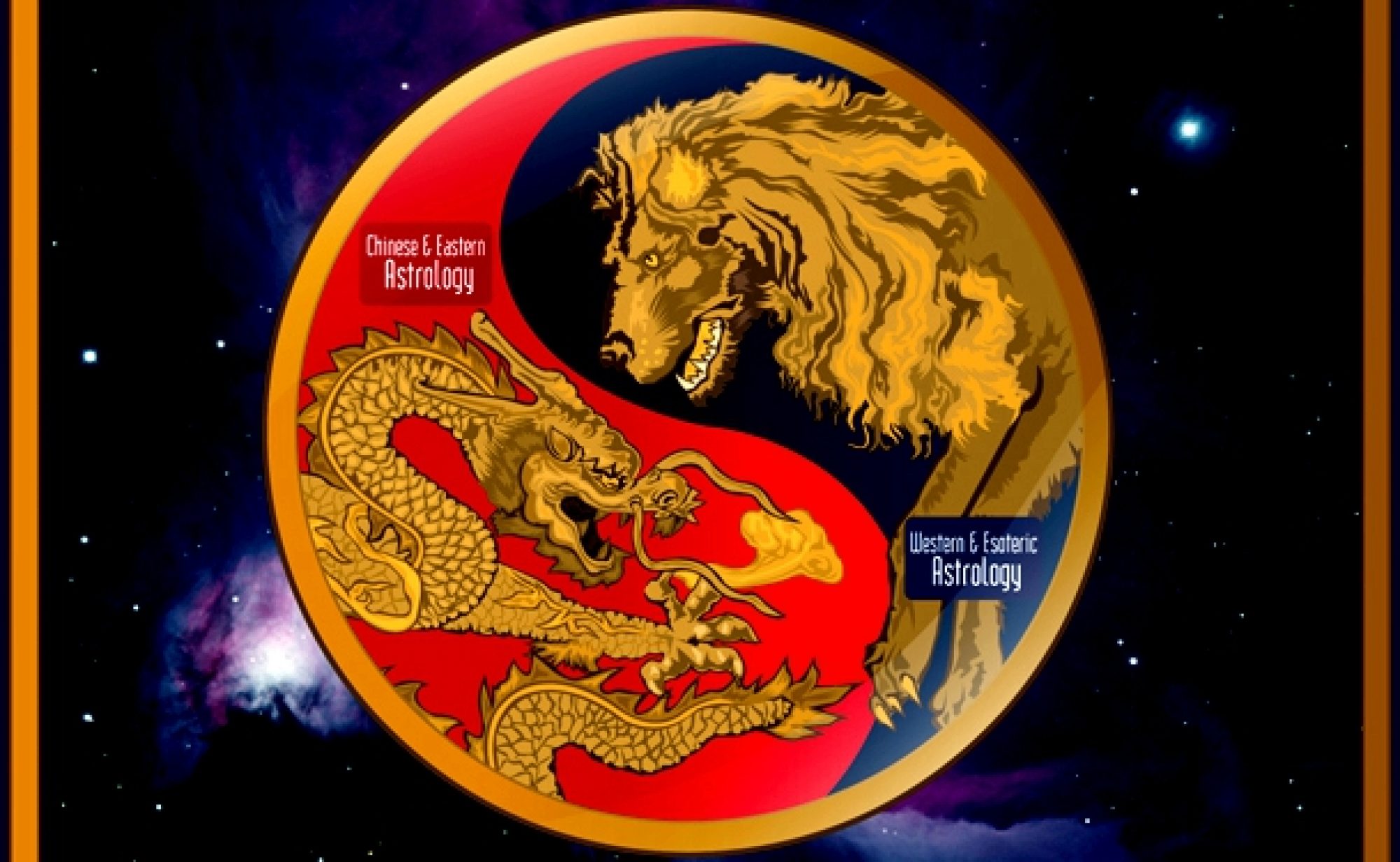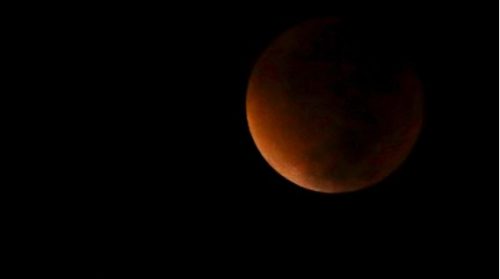Happy Chandra Grahan and Guru Purnima! For the first time in 149 years, apparently. But that’s not why we are here. We have an eclipse today, a lunar eclipse, and this particular eclipse signals important events to come. We’ll get to why later. In general, eclipses are a foundational piece of astrological knowledge and forecasting. What do eclipses signal and how? How do they affect us personally? Which ones are more important, or are they all of equal importance? So many questions and possibilities are indicated by eclipses. This short piece is my sharing of a thumbnail of the experience I have had with eclipses in forecasting and in looking at effects. There is much more that could be said, and books have been written on the subject. But, what follows could be called ‘eclipses in a nutshell’.
We won’t go over what eclipses are, except to say that an eclipse is a lunation (new or full moon) that takes place at the lunar nodes, where either the sun (solar) or moon (lunar) is obscured, either partially or totally by the other. So, there are two important points here:
- An eclipse in essence is also a ‘moon wobble’, producing strong emotional effects and often social discord.
- Eclipses, being either soli-lunar conjunctions (solar) or oppositions (lunar) are the most powerful such aspects in the zodiac and go far toward clarifying the lives of individuals and nations, depending on where they fall in a horoscope.
To put a finer point on the preceding, an eclipse is only important if it falls within a few degrees of a planet or angle in a horoscope. They can also activate midpoints, which is a refinement in forecasting, especially if there are questions of imminent importance, as in cases of illness, the possibility of disasters or on the other side, marriages, births and so forth.
There are essentially four types of eclipses, aside from being total or partial – solar or lunar, and north or south node – and combinations of those factors. For instance, the eclipse today is a lunar south node eclipse. The question then arises: Is there a difference between south and north node eclipses, or between solar and lunar eclipses? The answer is: It depends.
Some sources posit that south node eclipses highlight episodes from the past, the south node being associated with the past and legacy behavior. In my experience, that is not necessarily the case. Keeping in mind that both of the nodes are involved in any eclipse (it is the nodal axis, after all), all eclipses represent endings as well as beginnings. They should all probably be seen more in the vein of doorways. We can either go through such a door and leave aspects of the past behind and embrace a new path, or choose to stay where we are. If we choose the latter, at some point in the future the choice will be highlighted again, most likely in a more forceful manner. Sometimes, there is no choice as to the direction to take. Again, that depends upon a variety of factors, such as the activating planets, the planet or angle upon which the eclipse falls, the lord of the eclipse and so forth.
We have two new factors now – the activating planets and the lord of the eclipse. We’ll start with the ‘activating planets’. An eclipse in and of itself is an activation. This can be seen in several ways. Firstly, if we take a hard bump to our elbow and it leaves a sore spot, then we consider the elbow to be ‘activated’. Our awareness is constantly drawn to it, and we are protective of it. Occasionally, it receives further ‘activations’ as we brush against something or it receives further pressure. The elbow represents the planet or angle upon which the eclipse falls or the point opposite the eclipse. This latter is an important consideration, remembering that the nodal axis in toto is central to the eclipse. As such, eclipses mark changes in the way we relate to people and the outer environment, the nodal axis representing the way we relate. Any planet transiting on or opposite the eclipse point thus further activates the eclipse.
Secondly, an eclipse can be seen as an opportunity, as a positive development, possibly a brighter future. An eclipse activating a planet or angle thus piques our interest and keeps drawing our attention, that sense of excitement growing with each subsequent activation of the eclipse. Generally it takes a more self-aware person to adopt such an attitude, one unafraid to confront obstacles or who sees all life as an opportunity. If we can read the road signs of life, then all eclipses can thus be taken as opportunities, to perhaps take another path, fulfill some aspect of our life not previously available, be rid of troublesome issues or emotional ‘baggage’ and so on.
Regarding the so-called ‘lord of the eclipse’, this is the planet or sign that is conjunct the eclipse point, excluding the Sun and the Moon. That planet or those planets give the primary ‘coloring’ of the eclipse, to the exclusion of the node upon with the eclipse falls. The sign into which the eclipsed luminary falls also holds sway. For example, if we look at today’s eclipse, below (bigger), we note the Moon is conjunct both Pluto and Saturn in the sign Capricorn. Since it is a lunar eclipse, it is the Moon that must be considered as to the lord. The Moon is closer to Pluto, so the latter can be taken as the lord of the eclipse, thus giving this eclipse a Plutonian coloring. But the Moon is also in a wide conjunction with Saturn, and Saturn rules Capricorn, making it a powerful consideration. Thus, we could probably rightly assume that this eclipse has two lords – Saturn and Pluto – making this a particularly powerful eclipse and one that will bring with it much in the way of endings (Pluto) and karmic reckoning (Saturn). We have already seen this acting with another eclipse, which this one is also activating, later.

If there is no planet conjunct the eclipsed luminary, then the lord of the eclipse is taken to be the orthodox planet that rules the sign. Then, the lord of the eclipse can be the Sun (if in Leo) or the Moon (if in Cancer). Transits across the lord of the eclipse can also signal events related to the eclipse. The preceding paragraphs bring up an interesting question: How long do eclipses last? What is their lifespan? Opinions vary.
From what I have seen, the following rules apply as to the lifespan of eclipses:
- Unless an eclipse is activated by an outer planet (Saturn, Uranus, Neptune or Pluto), the effects of an eclipse can last from 3 – 5 years. Even then, there are caveats, as follows.
- If the eclipse falls on an Aries point (0° of Aries, Cancer, Libra or Capricorn) or on the 15th degree of fixed signs (Taurus, Leo, Scorpio or Aquarius) it will generally last for five years, as a general rule, unless completed by a transit from an outer planet.
- If an eclipse is subsequently activated by an outer planet, which generally happens several times, if so, due to the slow and retrograde motions of such planets, the eclipse will be ‘finished’, or ‘completed’ as to its purpose, and no longer active. This is especially the case with Saturn. Saturn will activate two eclipses soon – this one and the 13 Jul 18 eclipse – in short order. It has already activated the latter twice.
- If there is a stellium of planets (three or more) clustered around an eclipse point, the eclipse will last upwards of five years because there is unusual force gathered around the eclipse point.
- Lastly, an eclipse will be intensified if there is a planet or planets square the eclipse axis, as we see with today’s eclipse. Eris squares the eclipse axis, thus adding a discordant energy to this eclipse. Any planet transiting in hard aspect (conjunction, square or opposition) to the squaring planet will catalyze events precipitating from the eclipse. Such eclipses are generally longer-lived than ‘normal’ eclipses, according to the preceding rules.
Taking all the preceding into mind, the next question is, are there eclipses that are more important than others? Yes, in a word. In mundane charts, eclipses to Aries points and the 15th degree of fixed signs are particularly productive of earth-shaking events, both literally and figuratively. Eclipses to angles in a chart have an importance similar to Aries points regarding individuals and nations. The same is true of eclipses to luminaries.
Does it matter if the eclipse is a solar or lunar as to its strength or effects? In a word, no. Not in my experience, anyway. In this, we remember that the eclipse or its opposite point is activated by transiting planets. If any event is precipitated, it can produce strong emotional effects, whether an eclipse is solar or lunar. The events they signify depend upon the point or planet activated. There is an exception to be taken into account here, though.
If the eclipse is total – solar or lunar – its effect is intensified. Every eclipse belongs to a family, called a Saros cycle, and the total eclipses in that cycle mark the height of the power of such eclipses. Eclipses in a Saros family occur every 19 years and retrograde through the zodiac over many centuries. If such a total eclipse in a series falls on an Aries point, it is the high-water mark of the cycle. We had such an eclipse on 21 Jun 2001, the famed ‘9/11 eclipse’. That marked one of the most significant changes in world affairs in recent history. That brings up a further question.
Does the path of a solar eclipse matter? Yes and no – but in general, no. To individuals, it matters not at all. What is more important is the culmination line. The aforementioned “9/11 eclipse” traced a path across the southern half of Africa. Nothing much happened there after 9/11. But the culmination line ran straight through London and Paris, two nations strongly impacted by 9/11, in that they were heavily involved in the wars after the fact, as were nations in Western Africa as a result of US policies post-9/11. We cannot go into all that here. But then, why New York as the precipitating event from that eclipse? The closest culminating line there was the Venus/MC line, which took in the whole of the eastern US and western South America. 9/11 certainly went on to change Washington’s relations (Venus) and standing with the rest of the world. But if you want to see something of interest, look at the eclipse chart, relocated for New York.
The Moon was the lord of the eclipse, the eclipse being in Cancer with no other accompanying planets. In the NY chart, the eclipse is on the 12th house cusp in the 12th (hidden enemies of the state), with Eris (discord and warfare) in the 10th conjunct the MC. The Sabian symbols for the degrees of the angles are of particular interest. When Mars activated the eclipse on 9/11, opposite the eclipse point, it was in the 6th house (military operation). Cancer is concerned with the populace, homeland, security, and the US Sun is in Cancer. At the time of the activation, transiting Pluto was on the US Ascendant. The NY chart is a conspiratorialist’s dream, coupled with that of the US. We won’t go into more here, but it serves as an example.
But what do eclipses on my own planets/angles mean for me? The following might give some clues. But keep in mind, the house that a planet rules will define the field of experience that is affected by the eclipse. I had a personal example of this when I had an eclipse opposite the planet that rules my 10th house. When Pluto activated it, my particular line of work at the time came to an end. The natal planet is in the 9th house (work at a distance and overseas), and I had to leave the country as a result, as there was no more work. The 4th house (home) was activated by reflex. So, here are the general themes of the planets:
Sun: ego, vitality, glands in general, heart and spine, honor and honors, men in general
Moon: women in general, blood serum, digestive system, domestic life, edema, emotions, fertility, female disorders, pregnancy, lymph
Mercury: arms and hands, nervous system, young people, communications, lungs, breath and breathing, mental processes, eyesight, decision-making, sleep
Venus: hormones, kidneys, sweethearts, aesthetics, female accouterments, relations (intimate), beauty, sexuality
Mars: energy in general, body heat, muscles and tendons, sexuality (outgoing), active energy, self-volition, determination
Jupiter: liver and gall bladder, law, religion, the blood, nutrition, corpulence, judicial matters, wealth, expansiveness
Saturn: ambitions, bones, stones, old age, concentration, hard work, inhibitions, perseverance, seriousness
Uranus: change, suddenness, reform, nervous connections, excitability, newness, rhythm
Neptune: blood flow, receptivity, sensitivity, weakness, pineal gland, solar plexus, mediumship, sympathetic understanding of people, vagueness, lack of clarity
Pluto: collectivity, the masses, regeneration, providence, overpowering force, ruthless people, zealousness, convulsions and spasms, the sexual organs
The preceding is only suggestive. There is so much more to it. For mundane effects, a further introduction can be found on my site. We won’t go through the houses here. Whether the eclipse is solar or lunar makes no difference. The activating planets describe the method of change. The sign defines the background energy. The house position defines the field of experience thus affected, as does the planet activated. Solar eclipses in mundane charts are an exception.
Solar eclipses in a mundane chart, such as a nation’s chart, can indicate changes in leadership. The Sun rules leaders as a general rule, especially if there is no birth time for a chart. Mention was made of another eclipse – the 13 Jul 18 eclipse (below, bigger) – which was a solar eclipse at the 20th degree of Cancer. The Moon was the lord of that eclipse, too. It was a partial eclipse, but it was opposite Pluto, within a degree of exactitude. And, it occurred opposite the Moon of the UK’s chart. The Moon in that chart rules the 10th house, which represents the sitting government. That means that at the time Pluto was transiting across the UK’s Moon, and it was a troubling time. But it did not spell doom for May’s government. As to the eclipse itself – and this goes to illustrate a point – there were no earth-shaking developments for the UK on or around 13 July that year, except for Trump arriving in London the day before the eclipse. There were mass protests against his visit (the eclipse in Cancer, opposite the UK’s Moon).

Now comes the good part. On the 29 March of this year Saturn had transited to within a degree of orb to its opposition of the eclipse point, conjunct the Pluto of the eclipse. That was the date the UK was supposed to leave the EU. Obviously, it didn’t happen, despite the government’s wishes. Saturn is a stern taskmaster. Parliament was in disarray. Every attempt by the government to pass its Brexit bill failed spectacularly. And then, on 30 April this year, Saturn made its retrograde station opposite the eclipse point. There was a no-confidence motion against May being put forward by members of the Conservatives, at which point Theresa May saw the writing on the wall and tendered her resignation shortly thereafter, throwing open the run for her position. Saturn will start the beginning of the end of that eclipse at mid-December of this year. Pluto will have returned to its position opposite the eclipse point on Halloween, the date again when the UK is set to leave the EU. Any guesses as to what will happen?
So today, we have the present eclipse, which will activate this 13 Jul 18 eclipse. What will come of it? Who can say? It will no doubt have effects on the UK. We covered this eclipse in a previous post and more in terms of meaning in the Cancer Festival letter. The culmination line runs through the Middle East. But, this eclipse will be short-lived due to the nature and number of activations it receives, maybe ‘lasting’ for less than a year. We’ll see. But the carry-on effects will be long-lived, especially regarding the Middle East. That again, is covered in the Cancer letter.
Lastly, there was an eclipse a couple of weeks ago, on 2 July. Eclipses always come in pairs, a couple weeks apart, sometimes in triads, spanning a lunar month. That particular eclipse activated the US Sun, remembering solar eclipses affect leaders in mundane charts. What happened a few days later? – Jeffery Epstein was arrested on child sex charges. The case has opened a huge can of worms, with breathless expectations across the political chasm in the US. And with that segue, we leave this piece now, with a bit more of a taste of how eclipses work. This leads us into the next article.


Thanks so much, Malvin, for your commentary on Eclipses. I’d call it ‘Eclipses 101’ Many thanks as it makes an understanding of Eclipses and activation points very clear. Thank you again for drawing this into world affairs. It is so important to be able to see the bigger picture.
Thanks Burke. Understanding eclipses is fundamental to forecasting. They can be seen as precipitating points, much in the way of solar arcs (directions). But solar arcs have a much shorter life span, lasting only a year before exactitude and then only a few months after, quickly waning. Put the two together and one has a clear picture for forecasting events, even though even that is not so cut and dried. Each planet and house rules multiple factors. Transits can be seen as the triggers for both solar arcs and eclipses, like seeding a cloud. There is a hierarchy of effects. I’ll write more on that in another article.